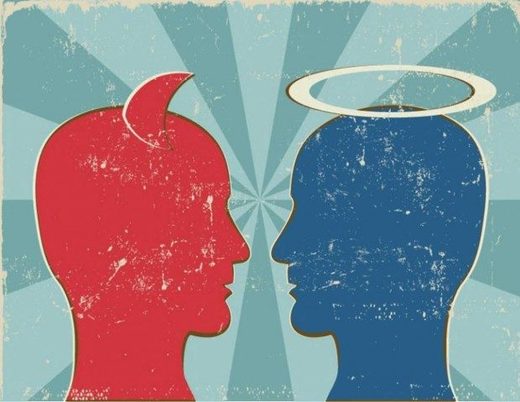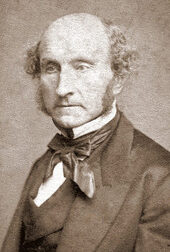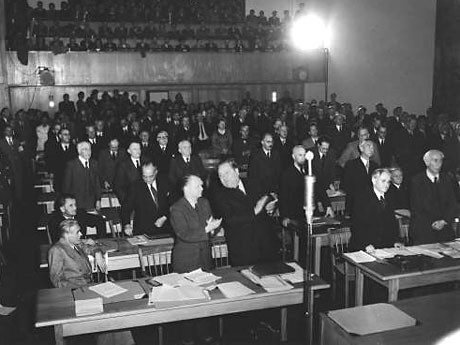Selvom dette er gyldige og vigtige argumenter, arbejder de stadig ud fra en forenklet utilitaristisk forståelse af etik: det handler om at beregne det bedste resultat, tælle de døde, maksimere menneskehedens velvære ved at veje en ting (virussen) mod en anden (foranstaltningerne) . Tvisten handler kun om variablerne.
Men jeg tror, at de fleste af os, der er kritiske til den aktuelle galskab, føler det i vores knogler, at der er noget dybt galt her, og det har ikke meget at gøre med tallene.
Antag, at denne virus virkelig var en dødbringende dræber, og at vi med rimelighed kunne forvente, at den dræber, lad os sige, 10% af befolkningen i hvert land. Ville du acceptere de nuværende foranstaltninger? Kan du synes det er okay, at staten fjerner din frihed og ansvar for at træffe de rigtige beslutninger i dit liv? Vil du besøge din ven i vanskeligheder, omfavne din far, gå i kirken eller sælge dine produkter og tjenester til dem, der stadig er villige til at købe dem?
Skal du i højere grad være i stand til at beslutte, om du vil tage risikoen for at besøge dine skrøbelige forældre, hvis du ikke har nogen symptomer for eksempel, fordi denne dybe pleje opvejer risikoen for at overføre virussen? Bør ikke de ældre selv beslutte, om de vil kæle deres børnebørn? Eller skal du ikke være den, der beslutter, om du skal møde nogle venner for at lave musik eller ej, den som afvejer mellem risikoen for at dø og det, der i det hele taget gør livet værd at leve?
Hvis dit svar er nej til nogen af disse spørgsmål, er du i vanskeligheder. Fordi i nutidens verden ser det ud til, at vi mangler viden til at retfærdiggøre vores mavefornemelse af, at nogle ting bare aldrig bør forbydes, nogle friheder aldrig begrænses, og nogle ting aldrig dikteres af staten. Hvis vi siger, at vi vil gå i kirke eller omfavne vores forældre, eller besøge en ven, der har brug for os, og nogen svarer, at dette muligvis dræber folk, og helt sikkert, at undgå død er vigtigere end at kramme din far, hvad skal vi så sige? Det efterlader os målløse. Vi ser på en måde pointen, men så igen, på en måde gør vi ikke.
Og det er heller ikke nok at pege på forfatningen. Hvis vi ikke forstår, hvorfor der overhovedet er noget i forfatningen og ikke kan forsvare det, selv hvis det kun er over for os selv, hvorfor skulle nogen andre så gide at gøre det? Folk vil bare påpege, at det er vigtigere at redde liv end et lille retsligt argument.
Så lad os tage et skridt tilbage og skabe klarhed om et par ting ved vores filosofiske baggrund i vores vestlige forfatninger, og hvordan dette relaterer til Corona-foranstaltningerne.
Higher and Lower Pleasures
As I mentioned, from a die-hard utilitarian point of view, such as advocated by Jeremy Bentham in the late 18th century, all you need to do is look at the greatest happiness of the greatest number of people to decide about any given action. Hence you count the dead, measure economic consequences and so on. But this whole idea collapses into all the familiar ethical and metaphysical problems once you ask about the definition of "happiness" or "well-being". Does one death trump a thousand jobless? How to measure the negative value of a death anyway in terms of "happiness"? One year life extension for an old man vs. 10 people who cannot observe their faith for a year? Two families ruined by the lockdown vs. one dead grandpa? Clearly, this doesn't get us anywhere. There is no way around asking the hard question: what is happiness?
Even John Stuart Mill, who is generally considered a utilitarian thinker, was way too smart to fall for the pure "pleasure maximization" doctrine of his mentor Bentham and modified it so much that it doesn't have much to do anymore with Bentham's simplistic formula. Mill wrote:
If I am asked what I mean by difference of quality in pleasures, or what makes one pleasure more valuable than another, merely as a pleasure, except its being greater in amount, there is but one possible answer. If one of the two is, by those who are competently acquainted with both, placed so far above the other that they prefer it, even though knowing it to be attended with a greater amount of discontent, and would not resign it for any quantity of the other pleasure which their nature is capable of, we are justified in ascribing to the preferred enjoyment a superiority in quality so far outweighing quantity as to render it, in comparison, of small account. (II 5)So for Mill, there are higher and lower pleasures, and the higher pleasures are preferable even if they may lead to discomfort. This implies that higher forms of pleasure can (and often do) involve risks. Heroism is an extreme example where you might die from an activity that gives you the highest form of pleasure. But we all know from our daily lives how pleasures of a higher nature are risky and yet worth pursuing - from challenging yourself on your mountain bike to taking risks for others.
Think of an old fragile grandma. She could just demand to be strapped to her bed and put on morphine - highly pleasurable indeed! But few grandmas would demand this, and we certainly don't encourage it, because we recognize the distinction between lower and higher pleasures Mill talked about. Instead, we encourage granny to go to the supermarket by herself, even if there is a high risk of her falling and dying. Or catching the flu and dying. Or spreading the flu and killing others. Or dying from the cold. We encourage this because we know that being as autonomous as possible gives granny a higher form of pleasure than vegetating in her bed on morphine.
But can we distinguish between higher and lower pleasures objectively? Immanuel Kant pointed out that autonomy of the will is a crucial element here: if we act freely based on the understanding of our mind, as opposed to based on mere impulses coming from outside and desires, then we can act morally. It leads, if you will, to a higher form of pleasure. And this is certainly in line with common sense: for example, few people would deny that gaining pleasure by eating cake all day long is a lower form of pleasure than sacrificing your comfort for the benefit of others because you have come to a deep understanding that this is the right thing to do.
What's more, Kant believed that there are abstract laws governing moral life, and that these principles are accessible to our understanding, which then, because we recognize them as true, act as a force against our impulses and mere desires. This gives rise to Mill's "higher pleasures". But if we recognize, as we must, that these moral actions go against our lower drives and impulses - including self-preservation and seeking comfort - then we must come to the conclusion that avoidance of risk, and indeed avoidance of death, can never be the most important value. Elevating death-avoidance to the highest value reflects an impoverished worldview that denies the very possibility of Kant's "mind world" to overcome and enrich the physical world.
For Kant, our ability to reason and come to a sound understanding of moral laws, and thus influence the natural world, is what makes us human - and what lets us operate in a different world, the world of the mind, beyond the world of mere appearances. It is this idea that leads to our concept of human dignity and the non-negotiable value of the human being.
The Value of a Human Being
Kant famously recommended:
So act that you treat humanity, whether in your own person or in the person of any other, always at the same time as an end, never merely as a means.This is not to be understood necessarily as a practical rule to guide our everyday decisions. Rather, it's an important philosophical point: human beings should never be treated as mere objects, mere tools to further some goal, for the simple reason that they are not objects. They are sovereign subjects, capable of reason and insight, and capable of moral actions based on understanding. Therefore, in the words of the late conservative philosopher and Kant scholar Roger Scruton, we always should see "I to I" with other human beings. Our perception of, and relationship with, others should be one of Subject to Subject.
We often take the idea that every human being has intrinsic value for granted, though we really shouldn't, especially in light of certain trendy theories that proclaim we are just deterministic machines without any free will, guided by selfish genes. Obviously, such machines have neither intrinsic value nor rights - because they have no responsibility. Our philosophical and legal traditions therefore are based on an understanding of humans as free, responsible beings - autonomous moral agents in Kant's terminology.
We don't ascribe intrinsic value to humans because "every human is good at heart". We know this isn't true. It is because every human is responsible for his or her actions and therefore has the potential to act ethically based on understanding. Or not: people do go wrong, and often spectacularly so. But since there is always the possibility of redemption, always the possibility to come to a deeper and more truthful understanding of the laws governing morality, small as this possibility may be, there is always value in every human life (besides the fact that it's often difficult to tell good from bad anyway).
We instinctively recognize this sanctity of free moral agency. For example, we can and must deal with criminals. But we know there are limits here: we value due process, even though it might be more effective to fight criminality by beating up everyone for every minor transgression. Or worse, imagine we could develop some kind of technology that "reprograms" every mind so that everyone feels horrible pain the second they think about committing a crime. Would you like such a thing to be deployed? I hope not. This is the stuff of dystopian movies, and they are all intended as warnings against totalitarian societies that use the excuse of "saving lives" to grossly violate our deepest values, such as the autonomy of the mind, thereby losing all legitimacy. A criminal whose mind is artificially forced to refrain from criminal thoughts does not act based on an understanding of the laws that govern the "mind world". In fact, we would deprive the criminal of any way of redemption, of coming to this understanding by himself. Such mind-altering technology would be a monstrosity, no matter how many lives it would save.
So we see that moral autonomy and the idea that everyone has value are linked. The rights granted to us by our constitutions, as well as our human rights, are based on our intrinsic value as human beings, which is an expression of freedom and responsibility: autonomous moral agency. It is no wonder then that freedom rights feature so prominently in our constitutions.
However, freedom rights have practical and legal limits - and for good reasons. You cannot do whatever you like without legal repercussions. But you can never lose your intrinsic value, which is based on your autonomy as a moral agent. More to the point, all other rights are derived from this core idea. If you give up this core concept, you lose the justification for all other rights, and therefore the justification to protect them. This includes the right to life.
Needless to say, this line of reasoning, pioneered by the enlightenment thinkers who sought a rational defence of the intrinsic value of the human being without 'cheap' recourse to the bible, is the main line of intellectual defence we have against modern forms of state tyranny. After all, an Orwellian dictatorship or Huxley's Brave New World might keep us safe and well-fed, confined to our homes and hooked on morphine like the poor grandma (or, lest you missed the point, quarantined to our homes hooked on Netflix, video games and porn). But following Kant and the liberal thinkers, we recognize that if we are deprived of our autonomy as moral agents, we are deprived of our very value as human beings, and therefore lose all our rights - even our right to live. Which makes all measures 'for our safety' pointless and hypocritical.
This is also the deeper (Kantian) reason why torture is strictly prohibited in most civilized countries. If we torture someone to 'save lives', for example, we immediately destroy the very reason why those lives should be saved in the first place. Why save anyone if we don't assume that each life has intrinsic value based on moral agency? And if we assume that, how could we destroy someone's spirit, his very freedom of the mind, his very essence as a moral agent, by torturing him, even though he might be a 'bad actor'?
While some of these arguments might be hard to swallow for some, I believe it should be clear by now that 'every life counts!' is a ridiculous statement. We should rather say 'every human's dignity counts', or 'every life counts for the reason that it belongs to a sovereign subject and not to a mere object of some agenda.' Which of course leads to the question: if the state treats an entire population merely as potential virus spreaders, takes away our dignity as responsible moral agents, and deprives us of some of the most fundamental ways to express this autonomy, indeed to express our understanding of the moral world, for example by showing affection to loved ones and friends even though there is danger, isn't the state losing all justification to act in the name of good?
All in all, I think the reason why the current madness makes us so uneasy is not primarily because the numbers don't add up. It is because we are treated like remote-controlled idiots, reduced to worthless meat sacks without moral agency, to mere virus-spreading machines who need to be told what to do and who are expected to give up the core of what makes life worth living. It is a war that takes place in the sphere of Kant's "world of mind and reason" - against us. And this is much worse than death.
Constitutional Questions
The philosophical background I just gave informs much of our understanding of constitutional law, even though we often can't put it into words. For this reason I hope that some of our highest courts will give those responsible for the current Corona tyranny a thorough beating. Perhaps this is wishful thinking, given how corrupt our world has shown itself to be. But I'm convinced that in a sane world, this is precisely what would happen.
Let's look at the German constitution as an example. This is significant because our constitution, called Basic Law, was written directly after the Nazi experience. Its authors took great pains to make it as difficult as possible for any wannabe tyrant to emerge again. Furthermore, they used modern concepts to enshrine some of our deepest values, as opposed to older constitutions that sometimes didn't take the trouble of spelling out such things. The reason might be that people back then could not imagine tyrannies being justified by an absolute right to safety because they took concepts like the divine nature of human beings and indeed the immortality of the soul for granted. Insofar as they showed tyrannical tendencies, they used different justifications, such as religious and moralistic arguments. The Germans after Hitler, on the other hand, knew exactly how dangerous the pretext of 'saving the German Volk from harm' can be, and how it can be abused to turn us into mere beasts in a cage.
Consequently, the first article in our constitution is not the "right to life" or something like that, but reads:
Article 1It's the first article, and it has the strongest wording of all: "untouchable". Not only that, legally, this article is entirely without limits! In the law, it trumps everything, without exception. It is also unchangeable - not even by parliament with an unanimous vote. It is valid "forever" (article 79). This is a result of the Weimar Republic experience, but it also directly follows from the philosophical background which acknowledges that the intrinsic value of a human being is more important even than biological life (which belongs to Kant's world of appearances) itself.
(1) The dignity of the human being is untouchable [irrevocable]. To respect and protect it shall be the duty of all state authority.
Now let's look at article 2 of the German constitution:
Article 2Notice that section (1) emphasizes, again, freedom. More specifically, it is about "free development of the personality", which goes back to the Kantian idea that our intrinsic value lies in our capacity for moral agency. This is our dignity. The whole article is under the banner of "personal freedoms". And only then, in section 2, comes the "right to life", which by the way is primarily intended as a right against the state, and also an obligation of the state to protect this right against third parties (i.e. persecution of criminals). But because the authors knew that the "right to life" can be abused for all kinds of tyrannical laws, they again, in the same breath, emphasize freedom: "Freedom of the person shall be inviolable". Wise men, these, I'd say. Of course, there can and must be legal limits here, but I think the spirit of the law is crystal-clear.
[Personal freedoms]
(1) Every person shall have the right to free development of his personality insofar as he does not violate the rights of others or offend against the constitutional order or the moral law.
(2) Every person shall have the right to life and physical integrity. Freedom of the person shall be inviolable. These rights may be interfered with only pursuant to a law.
All of this means, of course, that the 'right to life' can in no way be considered absolute. 'Every life counts!' is not a valid argument according to our constitution. No, in German law every human's dignity counts. An 'administrated meat sack' has no dignity and therefore no rights, not even the right to live, so without dignity - nothing. That is to say, preventing death is not and can never be the most important objective of the state.
You can see how the Constitutional Court in Germany (our highest court) applies these laws in a famous verdict from 2006 which declares a law void that allowed shooting down passenger planes if they are hijacked by terrorists. The judges wrote:
The passengers and crew members exposed to such an operation are in a hopeless situation for them. They can no longer influence their living conditions independently of others in a self-determined manner. This makes them an object not only of the perpetrator. Even the state, which in such a situation resorts to the defensive measures of § 14 (3) LuftSiG, treats them as mere objects of its rescue operations for the protection of others. Such treatment disregards those affected as subjects with dignity and inalienable rights. By using their killing as a means of saving others, they are objectified and at the same time deprived of their rights; by unilaterally disposing of their lives by the state, the passengers of the aircraft, who are themselves in need of protection as victims, are denied the value that humans have for their own sake. Moreover, this happens under circumstances which do not allow us to expect that the actual situation can always be fully understood and correctly assessed at the moment when a decision is to be made on the implementation of an operational measure in accordance with § 14 para. 3 LuftSiG.An introductory text describes the background of this so-called "object formula" in these words:
According to the understanding of the Federal Constitutional Court, human dignity gives rise to the right of every human being to be treated in all state proceedings always as a subject and never as a mere object.As you can see, both the German constitution and, as a result, the courts, follow a Kantian approach and are even willing to sacrifice lives for the protection of the fundamental value of the human being as a free agent. The court explicitly rejects a purely utilitarian method of "counting the dead," especially since we can never be 100% sure about the outcome of any given situation. And yet, such utilitarianism was immediately and almost globally applied to measures taken by governments in response to 'the Corona'. By the way, the Constitutional Court in Germany recently ruled that demonstrations cannot be forbidden even in times of Corona. Legally, at least, the Germans have learned a thing or two from their Nazi experience. Whether that is enough to prevent history repeating remains to be seen.
The ethical-legal standards that are binding for the legislator according to this "object formula" were last described by the Federal Constitutional Court in February 2006 in its ruling on the Aviation Security Act14 : Based on the idea of the Basic Lawmaker that it is part of the nature of mankind to determine himself in freedom and to develop freely, and that the individual can demand to be recognised in principle as an equal member with inherent worth in the community15 , it rather generally excludes the obligation to respect and protect human dignity to make man a mere object of the state16 . Thus, any treatment of human beings by public authorities which fundamentally calls into question their quality as subjects, their status as legal subjects, is absolutely prohibited.
Whatever the legal fall-out will be from all of this, those of us who instinctively feel that there is another layer to it, a layer that has to do with fundamental philosophical and metaphysical positions, need to relearn our language in the face of an onslaught of sophistry levelled at us 24/7. We need to get our story straight - a story that people in the past took for granted but that we need to learn how to defend these days. It is the story of a world beyond simplistic calculations, moralistic manipulation and guilt-tripping, all of which are a cruel insult to our deepest values. A world that goes beyond mere appearances and physicality, a world embedded in Kant's world of the mind and reason. We who see the world in a different light - let us stick to it and let us not give the trolls and guilt-trippers one inch of our sacred space.







Læserkommentarer
dig vores Nyhedsbrev